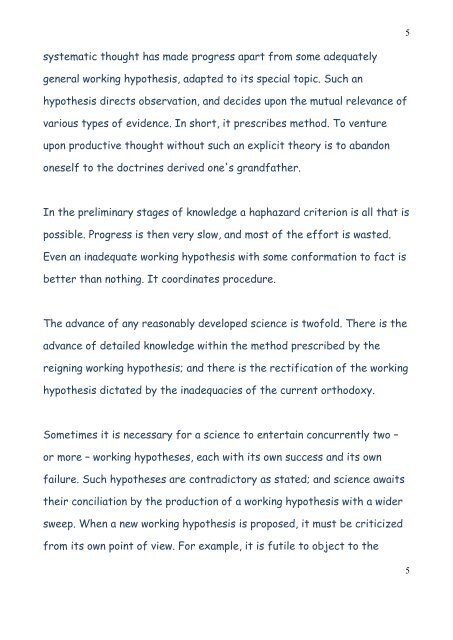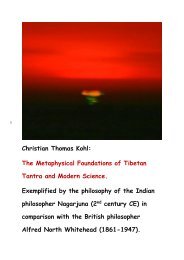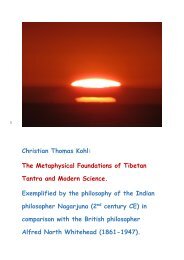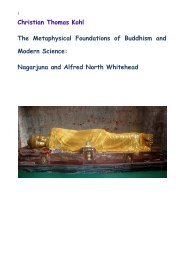The Metaphysical Foundation of Buddhism and Modern Science
The Metaphysical Foundations of Buddhism and Modern Science: Nagarjuna and Alfred North Whitehead
The Metaphysical Foundations of Buddhism and Modern Science: Nagarjuna and Alfred North Whitehead
Create successful ePaper yourself
Turn your PDF publications into a flip-book with our unique Google optimized e-Paper software.
5<br />
systematic thought has made progress apart from some adequately<br />
general working hypothesis, adapted to its special topic. Such an<br />
hypothesis directs observation, <strong>and</strong> decides upon the mutual relevance <strong>of</strong><br />
various types <strong>of</strong> evidence. In short, it prescribes method. To venture<br />
upon productive thought without such an explicit theory is to ab<strong>and</strong>on<br />
oneself to the doctrines derived one's gr<strong>and</strong>father.<br />
In the preliminary stages <strong>of</strong> knowledge a haphazard criterion is all that is<br />
possible. Progress is then very slow, <strong>and</strong> most <strong>of</strong> the effort is wasted.<br />
Even an inadequate working hypothesis with some conformation to fact is<br />
better than nothing. It coordinates procedure.<br />
<strong>The</strong> advance <strong>of</strong> any reasonably developed science is tw<strong>of</strong>old. <strong>The</strong>re is the<br />
advance <strong>of</strong> detailed knowledge within the method prescribed by the<br />
reigning working hypothesis; <strong>and</strong> there is the rectification <strong>of</strong> the working<br />
hypothesis dictated by the inadequacies <strong>of</strong> the current orthodoxy.<br />
Sometimes it is necessary for a science to entertain concurrently two –<br />
or more – working hypotheses, each with its own success <strong>and</strong> its own<br />
failure. Such hypotheses are contradictory as stated; <strong>and</strong> science awaits<br />
their conciliation by the production <strong>of</strong> a working hypothesis with a wider<br />
sweep. When a new working hypothesis is proposed, it must be criticized<br />
from its own point <strong>of</strong> view. For example, it is futile to object to the<br />
5


















